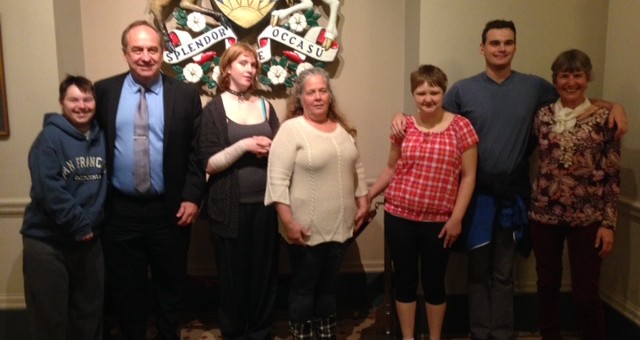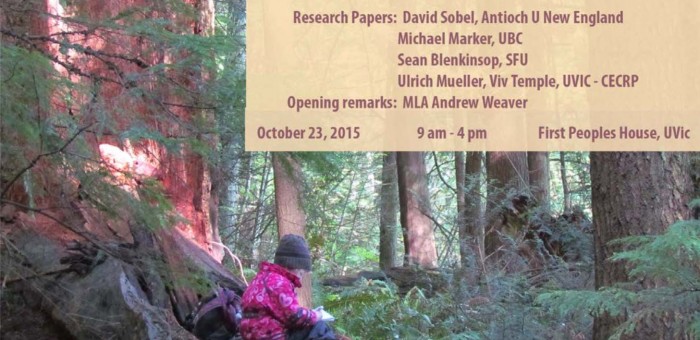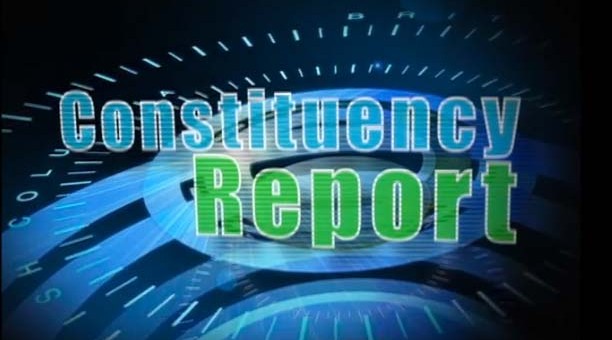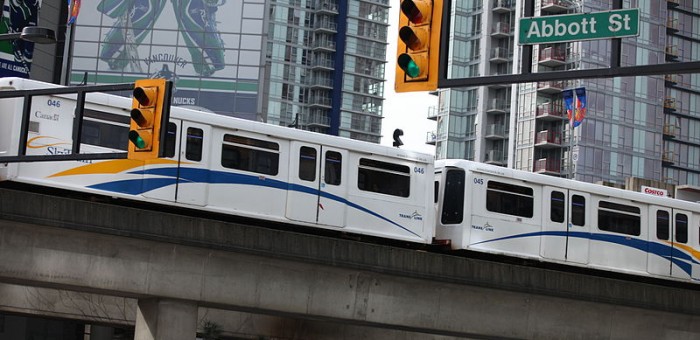Community Blog
Welcoming a Class from South Island Distance Education
One of the joys of being an MLA is welcoming students of all ages to the Legislature, showing them some of the history and beauty of the building and on occasion introducing them in the House. Today was one of those pleasurable days.
I had the distinct pleasure of meeting a class of special needs students from the South Island Distance Education School (SIDES). These are young adults transitioning from high school who are learning life and social skills, increasing their reading and math levels and learning about the community. SIDES offers a wide range of courses and classes, often through the internet, to students throughout the province with a teaching and support staff dedicated to ensuring school children and young adults of all abilities can obtain the education credits to graduate, and skills to enter the work force or post-secondary courses.
Thank you to the teachers Elaine Ethier and Dana (pronounced as in banana) Crow for bringing the students Becky Hansen, Joel Wright, Ben Vanlierop and Emily Medwid. It was a delight to be able to introduce all of you in the House today.
The Wonders of Nature Research Day
Today I was afforded the honour of delivering the opening the opening remarks at the Wonders of Nature Research Day put on by UVic’s Centre for Early Childhood Research and Policy. The research days featured presentations by a number of distinguished scholars including:
- David Sobel, Department of Education, Antioch University, New England
- Michael Marker, Department of Educational Studies, University of British Columbia
- Sean Blenkinsop, Faculty of Education, Simon Fraser University
- Ulrich Mueller, Department of Psychology, University of Victoria
- Viv Temple, School of Exercise Science, Physical and Health Education, University of Victoria
- Enid Elliott, School of Health and Human Services, University of Victoria
Below is the text of my opening remarks.
Text of Opening Remarks
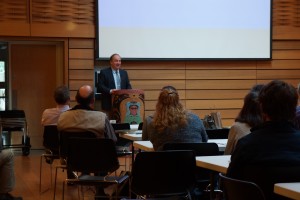 I would like to start off by thanking Beverley and everyone at the Centre for Early Childhood Research and Policy for inviting me here today and for organizing this wonderful conference. As Beverley pointed out, my name is Andrew Weaver and I’m the Member of the Legislative Assembly representing the riding of Oak Bay-Gordon Head — home to the University of Victoria.
I would like to start off by thanking Beverley and everyone at the Centre for Early Childhood Research and Policy for inviting me here today and for organizing this wonderful conference. As Beverley pointed out, my name is Andrew Weaver and I’m the Member of the Legislative Assembly representing the riding of Oak Bay-Gordon Head — home to the University of Victoria.
I have been in the Legislature for about two and a half years now, but before that I actually worked right here at UVic as a Faculty Member in the School of Earth and Ocean Sciences. In parallel with my endeavours in research, I’ve spent a good deal of time engaging the public in discussions about the importance of nature and our environment, and the detrimental path we are headed down if we don’t take action to reduce ongoing loading of the atmosphere with greenhouse gases that are causing global warming.
While it is easy to become disillusioned and worn out working in the field of climate science — seeing the path we’re headed down and fighting an uphill battle to try and make governments and policy makers see it too — it is our children and youth that inspire me — give me hope for the future — and keep me optimistic after so many years in this field.
In fact, one of my favourite parts about my role as MLA, is being able to go into schools and universities and speak to children and youth about our environment and the importance of civic engagement. Seeing their keen interest and appreciation for our natural environment and their desire to make our world a sustainable place is truly what inspires me in my daily work down in the legislature.
Because of this, I was very honoured when I was asked to provide opening remarks here today — I’m just disappointed I won’t be able to stick around to learn about the fantastic research that is being done in this area.
I was actually fortunate enough to experience a nature school program first-hand about a year and a half ago. I was invited by Savory Elementary School to be an “Eco Expert” for their “4 Seasons Eco School”. The program, which I believe was in its inaugural year when I visited, ran each Wednesday and provided all students with the opportunity to learn outside in Savory’s surrounding ecosystem, bringing in a new guest expert each week to guide the children.
I got to spend an entire day, from 8:30 in the morning to 2:30 in the afternoon, delivering a lesson plan to seven separate classes and engaging with every grade from Kindergarten to grade 6. To say that I was exhausted by the end of it would be an understatement, but it was also a truly unforgettable and inspiring experience — and helped to further my respect and appreciation for our teachers who do far more than I did, but on a daily basis.
Over the last decade as a scientist I’ve also had the privilege of working with school districts across Vancouver Island to install more than 150 weather stations on schools (Islandweather.ca for those who are interested), and to develop learning resources, in collaboration with teachers, to allow them to deliver their curriculum using state-of the art instrumentation and an authentic learning experience. Getting out of the ivory tower and into the community to discuss science, weather and our natural environment has been — to be perfectly frank — the single most satisfying and rewarding experience I have had as a scientist.
In today’s technology driven world, where young children are spending as much as eight hours a day interacting with screens — and often less than an hour a day actually outside – I firmly believe that providing children with the opportunity to experience “the wonders of nature” is one of the most important things we can do to help foster their development. While I am by no means an expert in the topic — you will hear from them later — I do know that there is a vast amount of research to demonstrate just how important time spent outdoors is to early development. Studies have shown that children who interact with nature on a daily basis are healthier, happier, more creative and less stressed than those who don’t.
And these benefits are not only felt in childhood. Researchers continue to develop a better understanding of the lasting impacts that early childhood experiences can have on our lives. Whether we remember the experience or not, and whether we are aware of magnitude of those experiences or not, they can stick with us throughout our entire lives. We carry them with us through our adolescent and teen years, into young adulthood and beyond. Developing an understanding and appreciation of nature at an early age will have a lasting effect on children.
And these benefits will not just be felt by the children fortunate enough to experience this type of learning environment. They will be felt by their peers, their families, their communities, and society as a whole. They will impact the way they interact with other people, the way that they view and interact with their environments — both built and natural, and the way that they engage in their future careers.
In a few decades, the children that we’re talking about today will be our teachers, our researchers, our scientists, our policy makers, and our government leaders. They will be making the decisions that influence our society, implementing the policies that protect our environment, and educating an entire future generation of children on the importance of our natural world. So the fact that you are all here today, discussing such an important initiative, is a truly inspiring sight to see!
Thank you again for having me here to speak today and enjoy the rest of the conference!
Constituency Report – October 2015
Constituency Report is a public service that Shaw TV graciously offers MLAs. This month’s video is provided below.
Judy Fainstein and I tried something different this time. For the first segment we discussed legislative issues relevant to Oak Bay-Gordon Head and British Columbia in general. In the second segment, I introduced Rory Hills, a recent graduate from Oak Bay High School. Rory and I had a wide-ranging discussion on the topic of youth engagement in politics.
I’d be interested in your feedback on this constituency report.
Constituency Report
Dementia-Friendly Communities Workshop
I was pleased to co-host a recent workshop provided by the Alzheimer Society of B.C. at Berwick House Retirement Community in Gordon Head. The workshop was given by Rebecca Morris, Provincial Coordinator, Advocacy & Public Policy at the Alzheimer Society of B.C. This highly informative presentation provided valuable information about dementia and how we can create more supportive communities for people with dementia, their families and caregivers. The Alzheimer Society of B.C. is the leading source of education, support, services and information for people affected by dementia.
‘Help for Today. Hope for Tomorrow…®’ is the Society’s tagline and we know education is key to reducing the stigma and judgement of those 70,000 British Columbians who live with dementia – 10,000 of whom are under the age of 65. It is estimated that, in 30 years, more than 177,000 British Columbians will be living with the disease.
The goal of the Dementia-Friendly Communities campaign is to create heightened awareness about dementia and to support people with dementia to participate in their communities to the fullest extent possible.
We all have a role in creating dementia friendly communities, as we were told by Mr. Jim Mann, who was a speaker during the presentation. Jim, who was diagnosed with dementia at the age of 58, is part of the BC leadership Group with the Alzheimer Society of B.C. and he shared his story and personal experience with us. Jim spoke of his journey with humour, acceptance and openness. He told us he is willing to “talk to anyone” in his tireless quest to “advocate to educate”. Clearly, Jim is a rock star for the organization.
Five things to share about dementia:
- It is not a natural part of aging.
- It is not just about losing your memory – it can affect thinking, communicating and doing everyday activities.
- It is possible to live well with dementia.
- There is more to a person than a diagnosis of dementia.
- The Alzheimer Society of B.C. is here to help.
Some useful myth-busting in the presentation taught us that dementia is not….
- Strictly a genetic disorder
- A disease that only affects older people
- Normal aging/memory loss
- Preventable
- Curable
- Caused by aluminum
- The end of a meaningful life
- That a person cannot understand what is going on around them
- That a person will become violent or aggressive
There is help and there are resources available! You can request a presentation from the Alzheimer Society by emailing dementiafriendlybc@alzheimerbc.org to find out more. You can help spread awareness by encouraging others to become Dementia Friends at www.dementiafriends.ca
The First Link Dementia Helpline is the first number to call for information. The Helpline is at: 1-800-936-6033 or (for the Lower Mainland) 604-681-6530.
The Alzheimer Society of B.C. provides much more valuable information and resources on their website.
I am very grateful to Rebecca and Jim for their excellent presentation and also want to extend my sincere thanks to Berwick House for welcoming us, providing refreshments and such a comfortable space for us to learn about the important work of the Alzheimer Society of B.C.
Probing the Government’s Lack of Leadership with Translink
Today in question period I rose to challenge the government’s lack of leadership with respect to Translink. Since the Metro Vancouver transit referendum failed earlier this year, we’ve been waiting for signs that this government understands the challenges facing the Lower Mainland’s transit infrastructure and that it understands the leadership role it needs to play.
Below I include both the video of the exchange as well as the Hansard transcript. At the end I reproduce the media statement my office released in conjunction with my line of questioning today.
Video of Question Period
Question
A. Weaver: Since the Metro Vancouver transit referendum failed earlier this year, we’ve been waiting for signs that this government understands the challenges facing the Lower Mainland’s transit infrastructure and that it understands the leadership role it needs to play.
The appointment of a new minister responsible for TransLink signalled to many that government was about to take its leadership role seriously. We heard almost immediately from the minister that “nothing is off the table” and that he had an open mind to changing the way TransLink was managed. And yet only a couple of months after those comments were made, we have heard that in closed meetings, the minister took the idea of giving more control over TransLink to local governments off the table.
Can the minister please let this House know what has changed since he said all options were on the table and what the minister’s plan is to ensure that the much-needed transit investments aren’t put off until it’s too late?
Minister’s Response
Hon. P. Fassbender: I appreciate the question, because at the meeting I had with the Mayors Council, I clearly said that we are willing to work with the leadership in the region to move toward solutions, not focusing on the problems but looking at opportunities for solutions. But I also challenged the mayors for them to step up to their leadership role in working with the board that they appoint to ensure that we find a path to solutions, that we look at the options that are available and to remember that this government has invested billions of dollars in transportation in the province and in Metro Vancouver.
This government is committed to working with the leadership in the region to find the solutions that will ensure an integrated transportation system for the citizens and for the movement of goods and services.
Supplementary Question
A. Weaver: Thank you, hon. Speaker, for giving me the opportunity to explore that a little more. The question of local control is critical because the province is dramatically under-resourcing its local governments, all the while requiring them to pay for a third of the transit costs.
Furthermore, both the minister and the Premier have slammed the door on the mayor’s plans to develop new, innovative funding solutions, saying that they will require a new referendum if they are to be considered. The government, frankly, has paralyzed transit planning in Metro Vancouver, and they have abdicated their responsibility to show British Columbians leadership.
My question to the Minister Responsible for TransLink is this. Since the provincial government clearly has no interest in providing leadership on the transit file, how does the minister expect local governments to move forward if the province is blocking local control over TransLink and preventing local governments from even considering innovative ways to make up for their lack of financial resources?
Minister’s Response
Hon. P. Fassbender: I know the member probably doesn’t know this or is choosing to ignore it, but I’m sure his taxpayers are very clear that they are paying hospital tax that is not being paid by the residents of Metro Vancouver. Also, clearly, from the day that I was appointed, the first thing I did was select two very capable people to sit on the TransLink board as government representatives, to clearly show that we are engaged in finding solutions and are willing to work with the region to ensure those solutions are found.
In addition, it is very clear this government has said our funding support for transit infrastructure development is on the table, and we’re simply asking the region to come forward with their recommendations on how they will fund their third. I find it interesting that the members opposite, as well, are opposed to asking the residents of Metro their opinion on future funding sources, because indeed, they have a right to do that, and this government will give them that right.
Media Statement
Media Statement October 8, 2015
Funding innovation required for local infrastructure projects
For immediate release
Victoria B.C. – In the B.C. Legislature today Andrew Weaver, MLA for Oak Bay – Gordon Head and Deputy Leader of the B.C. Green Party questioned the Honourable Peter Fassbender, Minister of Community, Sport, Cultural Development and Minister responsible for Translink, as to why the provincial government was restricting local government revenue options for critical infrastructure projects, specifically in Metro Vancouver.
Currently the Provincial Government is requiring Municipal Governments to account for one third of the total costs for transit improvements, despite the fact that the municipal governments receive substantially less in revenue than other levels of government.
“This approach by the government to restrict the ability of local governments to look at new forms of revenue, such as tolls or road pricing, to fund transit and other major infrastructure projects places them in an untenable position” said Andrew Weaver, “The Minister and Premier are risking a total paralysis in transit planning if any new funding sources will require a new referendum, as they are indicating.”
An option the provincial government could explore is using the province’s widely heralded carbon levy to assist Translink, and provide an available fund for communities throughout the province facing similar concerns. The carbon levy is currently fixed at $30 per tonne, and raises $1.3 billion annually in a revenue neutral fashion. Increasing the levy by $5 per year to a maximum of $50 would add an additional $1 billion annually after four years. The carbon levy could remain revenue neutral by ensuring local governments would not raise residential taxes to fund major infrastructure projects.
“The Provincial government has been quick to pass off new responsibilities to local governments, but has completely restricted any new financial resources or innovative funding sources.” said Andrew Weaver, “The premier and ministers continually call for innovation from local government. It is about time we saw some of that here in the legislature.”
– 30-
Media Contact
Mat Wright
Press Secretary – Andrew Weaver MLA
1 250 216 3382
mat.wright@leg.bc.ca
Parliament Buildings
Room 027C
Victoria BC V8V 1X4

